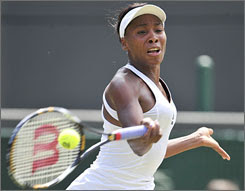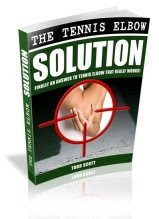The five-time champion wore a strap on her left knee Thursday but still advanced to the third round by beating Kateryna Bondarenko 6-3, 6-2.
The tournament favorite, Williams has been hampered by knee trouble in the past, but there was no indication of a problem this week until she walked onto sunny Court 1 bandaged from mid-calf to mid-thigh.
Williams let out a yelp when she appeared to pull up on a backhand in the third game, perhaps because of the knee. Otherwise she moved across the grass freely, charging forward to pounce on short balls. She won 17 points at the net to two for Bondarenko.
Williams was coy about the reason for the tape.
"Just for support," she said twice in response to questions.
Pressed about what was wrong with her knee, she said: "What happened was that I needed some support, and then I went and got the support, and then I wore it in the match. I'll be wearing it in doubles, too. So it's working out. I mean, I think all the players might start wearing it because it's so supportive."
Her mother and coach, Oracene Price, declined to discuss the matter. Williams wore the strap again later when she and sister Serena beat Virginie Razzano and Aravane Rezai in doubles, 6-3, 6-3.
The last woman to make the round of 32 was 17-year-old American Melanie Oudin, who beat darkness and Yaroslava Shvedova, 3-6, 6-2, 6-4. Oudin, a qualifier from Marietta, Ga., is ranked 124th and playing Wimbledon for the first time.
Another qualifier, 133rd-ranked Jesse Levine of Boca Raton, Fla., reached the third round at a major event for the first time by beating lucky loser Pablo Cuevas 6-2, 6-1, 4-6, 4-6, 6-3. That gave the United States three men in the round of 32, with Andy Roddick and Mardy Fish also remaining.
Roddick, a two-time Wimbledon runner-up to Roger Federer, lost serve only once and defeated Igor Kunitsyn 6-4, 6-2, 3-6, 6-2.
"It was comfortable most of the time," Roddick said. "I played my best set by far in the fourth set."
He'll next face good friend Jurgen Melzer, the Wimbledon boys champion in 1999. Roddick has won their eight previous meetings.
Lleyton Hewitt, who won Wimbledon in 2002, upset No. 5-seeded Juan Martin del Potro 6-3, 7-5, 7-5. Hewitt broke an 11-match losing streak against top-five players.
"I love playing in England," the Australian said. "It feels like a second home, really."
No. 3-seeded Andy Murray, trying to become the first British man since 1936 to win Wimbledon, defeated Ernests Gulbis 6-2, 7-5, 6-3. Fabrice Santoro, who plans to retire at the end of the year, was eliminated from his 14th Wimbledon when he lost to former No. 1 Juan Carlos Ferrero, 6-7 (1), 6-3, 6-4, 6-3.
Joining Venus Williams in the women's third round was French Open champion Svetlana Kuznetsova, who beat Pauline Parmentier 6-1, 6-3 in 59 minutes. The Roland Garros runner-up, top-ranked Dinara Safina, never faced a break point and beat Rossana de Los Rios 6-3, 7-5.
Last year's French Open winner, No. 13-seeded Ana Ivanovic, beat Sara Errani 7-5, 6-1. No. 17 Amelie Mauresmo, the 2006 Wimbledon champion, beat Kristina Kucova 6-3, 6-3. No. 18 Samantha Stosur, a Roland Garros semifinalist this month, swept the last five games to beat qualifier Tatjana Malek 4-6, 7-6 (6), 6-4.
Safina and Kuznetsova criticized the court assignments. Kuznetsova was on Court 3, while Safina and former No. 1-ranked players Ivanovic, Mauresmo and Jelena Jankovic were also on smaller courts.
"Of course it's not fair," Safina said. "Hopefully next match I'll play on bigger court."
"I'm fine to put me wherever they want to me put," Kuznetsova said in slightly broken English. "They don't have to put me Centre Court. But with the schedule, this is little bit weird thing. ... But, you know, in Wimbledon you have to expect anything."
Jankovic, seeded sixth, beat Iveta Benesova 6-2, 6-4.
The No. 3-seeded Williams lost only six points on her serve, two on double-faults. She slammed three aces in her first service game and finished with six.
She was just as ferocious with her returns. When one serve came at Williams slower than a lorry on the motorway, she eagerly stepped into the court, took a lusty swing and hit a winner.
That took her to set point in the first set, and she whacked another big return on the next point to win the set. There was no letup from there, and she swept the final four games.
"Everything was working for me today," she said.
The win was her 16th in a row at Wimbledon.
"Oh my gosh, that's a great statistic for me," she said. "I know a lot of people have done better than that, but that's a great achievement. I want to make it more."

















